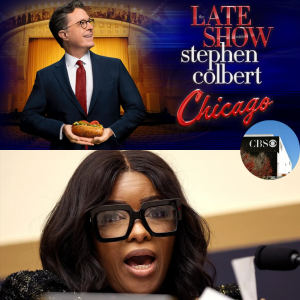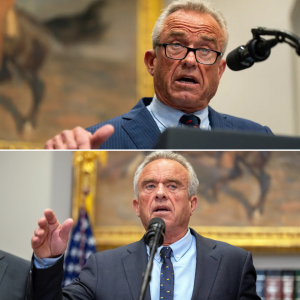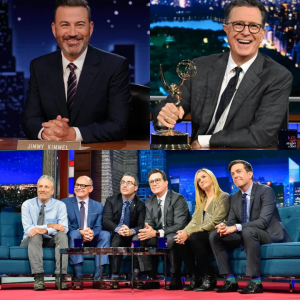In the high-stakes world of network television, where ratings and revenue often dictate the boundaries of expression, a single comment can ignite a firestorm that consumes headlines for days. Such was the case when late-night host Jimmy Kimmel found his show abruptly pulled from the air, a move that sent shockwaves through the media landscape. The ensuing silence from his own network, ABC, was deafening, leaving many to wonder about the forces at play. It was into this charged atmosphere that the women of “The View” stepped, not with a critique of their corporate employer, but with a full-throated condemnation of what they framed as government overreach. The complex saga of The View Jimmy Kimmel controversy became a flashpoint, raising profound questions about freedom of speech, corporate loyalty, and the immense pressure faced by media personalities in a deeply polarized nation. The hosts’ decision to aim their ire at the White House while sidestepping any mention of Disney or ABC’s role highlighted the delicate dance performers must navigate when their principles clash with their paychecks.
The Spark of Controversy: What Led to Kimmel’s Suspension?
The sequence of events began with a seemingly off-the-cuff remark. During his show, Jimmy Kimmel made a suggestion that Charlie Kirk’s alleged shooter was part of the “MAGA gang.” In an era of intense political division, the comment was a match thrown into a tinderbox. The backlash was swift and severe. The comment drew the attention of the Federal Communications Commission (FCC), which issued a veiled threat, a powerful reminder of the government’s regulatory power over broadcast media. The pressure mounted as two major ABC affiliate owners, crucial partners in delivering content to millions of homes across the country, made the bold decision to drop Kimmel’s program from their stations. This corporate-level reaction from Disney, ABC’s parent company, effectively benched one of its most prominent liberal voices, sparking an immediate outcry from progressives who saw the move as a capitulation to political pressure from the Trump administration. The incident quickly transcended a simple host’s gaffe, morphing into a national debate about where the line lies between controversial comedy and irresponsible speech, and who gets to draw it.
A Calculated Silence? The View’s Delayed Response
As the news of Kimmel’s suspension broke on a Wednesday, a conspicuous silence fell over one of ABC’s most vocal programs: “The View.” For the remainder of the week, the co-hosts, known for their fearless and often contentious political commentary, did not address the controversy surrounding their network colleague. This omission did not go unnoticed. Nicolle Wallace, an MSNBC host and a former co-host of “The View,” pointedly commented on the situation. “I was on ‘The View.’ Those women are fearless, and the story didn’t come up,” Wallace said on Friday, adding, “I mean, it’s obviously being felt and acted upon at ABC more broadly.” Her words fueled speculation that the network had pressured the show to stay quiet, creating a narrative of corporate muzzling. When the show returned on Monday, co-host Whoopi Goldberg met the speculation head-on. “Now, look, did y’all really think we weren’t going to talk about Jimmy Kimmel?” she asked the audience. “I mean, have you watched the show over the last 29 seasons? So you know no one silences us.” Goldberg explained that the panel “took a breath” to see if Kimmel wanted to respond first, a justification that sought to reframe their silence not as submission, but as professional courtesy.
The On-Air Defense: A Battle for Freedom of Speech
When the hosts of “The View” finally broke their silence, they did so with a unified and powerful message, carefully directing their criticism away from their employer and squarely toward the government. Whoopi Goldberg and Ana Navarro led the charge, framing the entire ordeal as a dangerous assault on the First Amendment. Ana Navarro, who has frequently drawn on her experiences living under dictatorships in Nicaragua, delivered a particularly impassioned speech. “This is what dictators do. It does not matter the ideology,” she declared. “At first, they come before the people with big platforms, at first they silence the press, but then they come for all of us because their intent is to scare us into silence and self-censorship. Look at the things that this government has done.” Her words cast the The View Jimmy Kimmel issue not as a corporate dispute, but as a patriotic struggle against authoritarian tendencies. Sunny Hostin, the show’s legal analyst, buttressed the argument with historical and legal precedent. She invoked former Supreme Court Justice Oliver Wendell Holmes Jr., stating, “We must protect the freedom to express the thought we hate.” Hostin continued by referencing a more contemporary justice, “So Justice [Sonia] Sotomayor said last week that ‘every time I listen to a lawyer-trained representative saying we should criminalize free speech in some way, I think to myself that law school failed.’” She concluded firmly, “Well, my law school, Notre Dame, didn’t fail… and the President of the United States should know what freedom of speech means.”
Targeting the Government, Sparing the Network

The strategic focus of the co-hosts’ criticism was impossible to miss. Throughout the segment, there was no mention of the decisions made by ABC or its parent company, Disney, who were the ones to actually pull Kimmel’s show. Instead, the entire blame was laid at the feet of the Trump administration and the FCC. This calculated approach highlighted the inherent conflict of interest faced by the hosts. As employees of ABC News, directly criticizing their employer’s business decisions on a flagship program would be a precarious move. By framing the issue as a defense of freedom of speech against government censorship, they could stand on principle without jeopardizing their positions. They championed Kimmel as a victim of a government vendetta, a narrative that resonated with their audience and allowed them to sidestep the more complicated internal politics of their own network. This maneuver allowed them to appear fearless and defiant while carefully navigating the corporate minefield, a testament to their experience in the often-treacherous media industry. The segment served as a masterclass in controlled outrage, allowing them to vent frustration and rally their base without biting the hand that feeds them.
Navigating the Complexities of The View Jimmy Kimmel Debate
While the hosts’ defense was passionate, it also simplified a complex issue. The First Amendment, which protects freedom of speech, primarily restricts the government from censoring individuals. It does not, however, prevent a private company like Disney or ABC from making editorial or business decisions about the content it airs. A network has the right to manage its brand and decide what programming aligns with its standards, especially when facing pressure from advertisers, affiliates, or a significant portion of the public. The hosts of “The View” effectively conflated a corporate decision, likely motivated by a mix of political pressure and financial calculation, with direct government censorship. By doing so, they rallied support for Kimmel and took a strong political stance, but they also glossed over the nuances of how free expression operates within a corporate media structure. The real tension was not just between a comedian and the government, but also between a network and its star, and between a company’s profit motives and its commitment to unfettered commentary.
In the end, the storm passed almost as quickly as it had gathered. News broke after Monday’s show that Jimmy Kimmel would be returning to the air on Tuesday night. But the questions raised during his brief absence linger. The The View Jimmy Kimmel incident served as a stark reminder of the fragile state of public discourse. It demonstrated how quickly political lines can be drawn and how powerful institutions, both governmental and corporate, can influence who gets to speak and what they are allowed to say. The hosts of “The View” chose their battlefield carefully, championing the broad principle of free speech while avoiding a direct confrontation with their own network. Their response was a reflection of the modern media landscape, where standing for a cause often requires a strategic calculation of risks. While Kimmel returned to his platform, the episode left an indelible mark, a cautionary tale about the intersecting pressures of politics, power, and the public airwaves in a nation struggling to agree on the meaning of its own freedoms.






